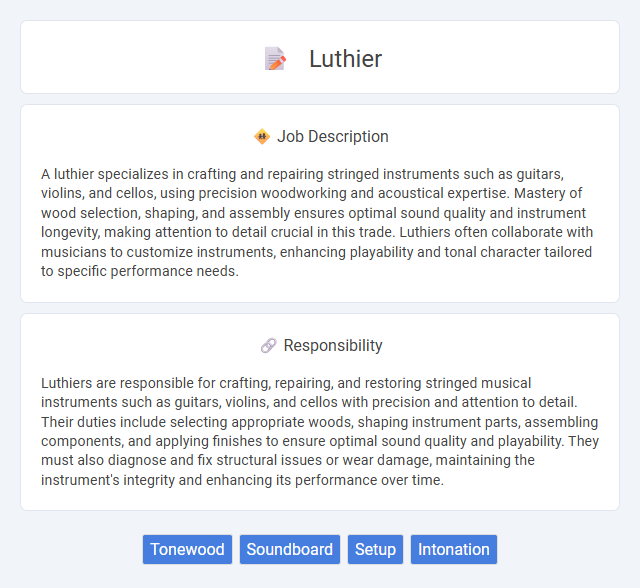
A luthier specializes in crafting and repairing stringed instruments such as guitars, violins, and cellos, using precision woodworking and acoustical expertise. Mastery of wood selection, shaping, and assembly ensures optimal sound quality and instrument longevity, making attention to detail crucial in this trade. Luthiers often collaborate with musicians to customize instruments, enhancing playability and tonal character tailored to specific performance needs.
Individuals with a strong passion for music and exceptional manual dexterity are likely well-suited for a career as a luthier, given the intricate craftsmanship required to create and repair stringed instruments. Those who prefer working with detailed, hands-on tasks and possess patience and steady hands probably find this profession fulfilling. People who thrive in highly precise environments and enjoy problem-solving may find a high probability of success and satisfaction in the luthier trade.
Qualification
A skilled luthier requires comprehensive knowledge of wood types, acoustic properties, and precision crafting techniques to build and repair string instruments such as violins, guitars, and cellos. Formal training often includes apprenticeships or specialized courses in instrument making, woodworking, and acoustics, complemented by hands-on experience. Key qualifications also involve mastery of fine motor skills, attention to detail, and an understanding of instrument design and sound quality optimization.
Responsibility
Luthiers are responsible for crafting, repairing, and restoring stringed musical instruments such as guitars, violins, and cellos with precision and attention to detail. Their duties include selecting appropriate woods, shaping instrument parts, assembling components, and applying finishes to ensure optimal sound quality and playability. They must also diagnose and fix structural issues or wear damage, maintaining the instrument's integrity and enhancing its performance over time.
Benefit
A luthier's expertise likely offers the benefit of restoring and maintaining string instruments, ensuring optimal sound quality and durability. Crafting custom instruments may provide musicians with personalized tonal qualities and enhanced playability. Skilled repair work potentially extends the lifespan of valuable instruments, preserving their investment over time.
Challenge
The job of a luthier likely involves intricate challenges requiring precise craftsmanship and deep knowledge of wood properties and acoustics. Mastering the delicate balance between aesthetics and functionality may pose ongoing difficulties, especially in crafting instruments that produce optimal sound quality. Overcoming these challenges probably demands patience, continual skill development, and adaptability to evolving musical trends and materials.
Career Advancement
Luthiers specializing in crafting and repairing stringed instruments can advance their careers by mastering advanced woodworking techniques and expanding their knowledge of acoustics and materials science. Gaining certifications from recognized institutions or apprenticeships with master luthiers enhances professional credibility and opens opportunities for higher-paying commissions or positions at prestigious instrument manufacturers. Networking within the music industry and developing custom design skills further increase demand and career growth potential.
Key Terms
Tonewood
Luthiers specialize in crafting and repairing string instruments, with tonewood selection being critical to sound quality. Different types of tonewood such as spruce, maple, mahogany, and rosewood influence the instrument's resonance, sustain, and tonal characteristics. Expert knowledge of wood density, grain patterns, and moisture content enables luthiers to optimize acoustic properties and create instruments with superior sound performance.
Soundboard
The luthier meticulously crafts the soundboard, the critical component responsible for acoustic resonance and tonal quality in stringed instruments such as guitars and violins. Selection of high-quality tonewoods like spruce or cedar ensures optimal vibration and sound projection, directly influencing the instrument's warmth and clarity. Precision in bracing patterns and thickness adjustments refines the soundboard's responsiveness, balancing strength and flexibility to achieve superior acoustic performance.
Setup
A luthier specializes in the meticulous setup of stringed instruments, ensuring optimal playability and sound quality. Key setup tasks include adjusting the truss rod, setting string height (action), and intonating the instrument for precise pitch across the fretboard. Proper setup enhances the instrument's tonal balance, sustain, and overall performance, tailored to the musician's style and preferences.
Intonation
Luthiers specialize in crafting and repairing stringed instruments, with precise attention to intonation to ensure accurate pitch and sound quality across all frets. Proper intonation adjustment involves meticulous measurement and modification of the instrument's scale length, string height, and bridge position to correct pitch discrepancies. Expert luthiers use specialized tools such as electronic tuners and fret analyzers to achieve optimal tonal balance and playability for professional musicians.
 kuljobs.com
kuljobs.com